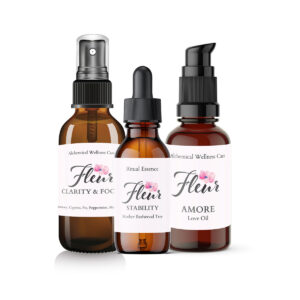“Dementia care—it’s not rocket science; it’s heart science.” –Gail Weatherhill
Memory impairment can be caused not only by aging or stress but also by neurodegenerative diseases such as Alzheimer’s disease. Dementia occurs when nerve cells in the brain become damaged. Recognizing that this affects several brain areas, most people experience it uniquely.
Consequently, there are various types of dementia which are generally categorized by two factors: the section of the brain damaged and whether or not the condition worsens. Of all the different subtypes, Alzheimer’s Disease is the most common in people over 65, and it’s interesting to note that research suggests essential oils can help Alzheimer’s patients considerably.
There is no cookie-cutter approach to memory care, but care that promotes social engagement and brain health is the most effective. Such elements include physical activity, cognitive stimulation, sleep hygiene, an appropriate diet – and flower essence aromatherapy.
Understanding the neuroscience behind dementia enables us to deliver flower essence aromatherapy results that help each other with brain health. Smell and memory seem to be so closely linked because of the brain’s anatomy.
Aromatherapy & Brain Health
Dementia currently affects about 50 million people in the world. Cognition combines two vital components, i.e., learning and memory. Learning is the ability to get and process new information, whereas memory refers to the storage capacity of this information and its use for future purposes. In several diseases, like Alzheimer’s and dementia, cognition is altered based on the severity or stage of the disease. (see my previous blog: Alzheimer’s Disease Awareness)
Studies have shown that active compounds in essential oils are detectable in blood samples following aromatherapy. These compounds may be absorbed through nasal or lung mucosa and can cross the blood-brain barrier due to their small size.
Worried you or a loved one are showing signs of dementia?
If you or a loved one are dealing with memory loss, increased confusion, reduced concentration, or decreased ability to do everyday tasks, these could be signs of dementia.
It is sometimes difficult for people to recognize that these symptoms indicate something is wrong. They may mistakenly assume that such behavior is a normal part of the aging process.
 Here’s how to spot the early symptoms of dementia and Alzheimer’s disease:
Here’s how to spot the early symptoms of dementia and Alzheimer’s disease:
- Inability to focus or concentrate: Accomplishing the most straightforward tasks is an issue. This is the case even with minor tasks. Decreasing attention span and concentration results in being easily distracted and difficulty focusing. The struggle to organize thoughts or make little judgments or decisions is common in day-to-day living, which in turn leads them to make impulsive decisions. They will also generally exhibit an inability to fully understand the consequences of their choices.
- Feelings of confusion: Feeling ‘spaced out’ and dissociated, a person can feel sluggish, unmotivated, and dull. There may be confusion about their environment, the time of day, or why they are in a particular place, even in familiar settings.
- Constantly forgetting things: Losing the train of thought and difficulty recalling the word for something they are looking for, such as the phone or the name of a place they need to go to and what one is supposed to do, and why can lead to anxiety. Maintaining a conversation is frustrating because of the inability to find the right words.
- Difficulty judging distances or color contrasts. In some instances, dementia can impact an individual’s spatial awareness. Spatial awareness is often used in everyday tasks like parking the car or catching falling items. For individuals experiencing early signs of dementia, this will frequently show up as increased clumsiness or an inability to perform basic physical tasks properly.
- Constantly fatigued: Fatigue and sleeplessness lend themselves to becoming easily irritable and too exhausted at any time of the day. It can feel that even with a morning cup of joe, they can’t function without tremendous effort, creating an energy deficit.
- Mood Changes. Sudden mood swings or changes are a common early symptom of dementia and are often noticed by loved ones or individuals who spend a significant amount of time together. For example, individuals might experience depression or become moody and socially withdrawn. It can also lead to individuals being less inhibited than usual or acting inappropriately. Being quick to anger or getting frustrated quickly is another common form this takes. If this happens repeatedly, it can often signify a deeper issue.
Fleur comfort care products are formulated for aging adults who are experiencing variations of these kinds of symptoms. Our Memory Care Kit is suitable for persons experiencing dementia at any stage.
Brain Boosting Formulas for Aging Adults
Aromatherapy and essential oils have been proposed as preventive and treatment strategies for anti-aging and neurodegenerative disorders such as dementia. Essential oils have been used for generations to ease symptoms of depression, anxiety, and insomnia.
The use of aromatherapy as a supplemental and non-pharmacological treatment for dementia and Alzheimer’s has become increasingly popular, both in the home and in clinical settings. There is solid evidence that essential oils are absorbed into the bloodstream when inhaled. Many blood vessels in the lungs absorb the oils and then circulate them throughout the body.
Flower essence aromatherapy may improve the overall quality of life for Alzheimer’s and dementia patients. While the search for comprehensive dementia treatments continues, studies suggest that aromatherapy may slow dementia symptoms.
Various small-scale studies have been conducted into the benefits of aromatherapy for dementia and Alzheimer’s with encouraging results. Certain essential oils can help to improve sleep, cognitive function, and memory while decreasing anxiety, agitation, aggression, and other psychotic symptoms. These studies have shown that inhaling certain aromas may stimulate or inhibit brain functions.
Essential oils comprise highly complex aromatic compound mixtures and contain various biochemical components in variable concentrations. Current research shows their neuroprotective and anti-aging potentials when used with patients with degenerating brain disorders, such as dementia and Alzheimer’s.
Several essential oils are proving effective for treating symptoms of dementia, including anxiety, sleep problems, and even memory and cognitive function.
The following essential oils are used in synergistic combinations with flower essences in our Clarity & Focus Spray to help stimulate the brain, increase focus, and reduce brain fog.
Peppermint Essential Oil
 One placebo-controlled study examined the effects of organic peppermint (Mentha piperita) essential oil on cognition and mood. Peppermint essential oil, when inhaled, was associated with reduced mental fatigue and improved cognitive performance. Peppermint is an energizer and can be used to stimulate the mind and calm nerves at the same time. Researchers suggest that the increased mental performance may result from menthol, a component in peppermint, binding to receptors in the nervous system and regulating the availability of acetylcholine, a neurotransmitter involved in cognitive functions such as attention.
One placebo-controlled study examined the effects of organic peppermint (Mentha piperita) essential oil on cognition and mood. Peppermint essential oil, when inhaled, was associated with reduced mental fatigue and improved cognitive performance. Peppermint is an energizer and can be used to stimulate the mind and calm nerves at the same time. Researchers suggest that the increased mental performance may result from menthol, a component in peppermint, binding to receptors in the nervous system and regulating the availability of acetylcholine, a neurotransmitter involved in cognitive functions such as attention.
Rosemary Essential Oil
Rosemary essential oil is best for mental clarity and improves memory and forgetfulness. Rosemary has also been known to ease constipation and symptoms of depression and also reinvigorate the appetite. Improvement in overall brain function and performance, alertness, focus, and concentration has been shown. Its stimulating actions wake up the brain and may help improve memory.
 Additionally, research in healthy humans has demonstrated that one of the active compounds found in rosemary (Rosmarinus officinalis) oil is also detectable in blood samples following aromatherapy. The level of aromatic components absorbed via smell was positively associated with the speed and accuracy of performance in cognitive tasks such as subtraction exercises and visual information processing.
Additionally, research in healthy humans has demonstrated that one of the active compounds found in rosemary (Rosmarinus officinalis) oil is also detectable in blood samples following aromatherapy. The level of aromatic components absorbed via smell was positively associated with the speed and accuracy of performance in cognitive tasks such as subtraction exercises and visual information processing.
These findings suggest that inhaling aromas of peppermint and rosemary may enhance cognitive performance.
Rose Essential Oil
There is a reason scent of roses symbolizes love, the opening of the heart, friendship, and intimacy. Rose essential oil (Rosa damascena) is one of those oils that are especially comforting and bring a smile to the elderly.
As it turns out, stopping and smelling the roses has some pretty impressive cognitive health benefits. A new study, which was published recently, found that rose scents can help with information retention and learning success—and sleeping with the aroma present can even give your brain a boost overnight.
The study reported that people under routine care and exposed to rose oil had better nights of sleep than those without exposure but were still under routine care.
The delicate aroma of rose otto strengthens brain function and can help with anxiety, depression, and stress. Rose aroma produces endorphins that can boost mood. The scent of roses increases positive energy levels and helps people feel secure and relaxed.
Another study reported that applying rose oil to the skin can help to reduce blood pressure, heart rate, breathing rate, blood oxygen saturation levels, and skin temperature when applied to the skin, which indicates a decrease in autonomic arousal.
Additionally, the oil of rose is incredibly healing and can help with dry, thin skin to reduce the appearance of surgical scars, calm inflammation and help with eczema and bed sores.
Comfort Care is Memory Care
 Formulated to enhance brain health and memory, our flower essence aromatherapy Memory Care Kit is safe to use when dementia symptoms are present.
Formulated to enhance brain health and memory, our flower essence aromatherapy Memory Care Kit is safe to use when dementia symptoms are present.
Flower essences are infused in our Memory Care products to add additional support with coping with dementia symptoms.
Our Memory Care Kit contains three flower essence aromatherapy products specially formulated to help the brain function. Clarity & Focus Spray, Amore Love Oil, and Stability Ritual vibrational essence.
Clarity & Focus Spray
Some of the essential oils in the Clarity & Focus Spray formula contain the following.
- Lemon (Citrus limon) – can increase neuroprotective function, memory, and attention levels in patients with dementia.
- Basil (Ocimum basilicum) – energizing and stimulating for brain function, memory retention, alertness, focus, and concentration; basil essential oil helps alleviate chronic stress and anxiety.
- Rosemary (Rosmarinus officinalis) is the best essential oil for increasing mental clarity, focus and concentration, alertness, and overall brain function, improving memory and forgetfulness.
- Peppermint (Mentha piperita) is one of the most potent aromatherapy oils for dementia patients who tend to forget by improving cognitive function, alertness, and focus, reducing nervous tension.
- Melissa (Melissa officinalis) – is probably the most studied of the essential oils for its effect on people with dementia, encouraging relaxation, anxiety relief, easing insomnia symptoms, and uplifting the mood.
- Vetiver (Chrysopogon zizanioides) – is neuroprotective, slowing memory loss and increasing alertness and concentration.
Clarity & Focus Spray is easy to use. Mist around the head and body to clear the fog, enhance thinking, and sharpen attention, focus, concentration, and memory. Its awakening and uplifting aroma are best used in the morning or mid-afternoon.
Amore Love Body Oil
Our Memory Care Kit contains Amore Love Body Oil formulated with the essential oil of Rose otto and specific flower essences, which are alchemically formulated and diluted in a base of jojoba oil for safe application.
The familiar scent of roses takes people back to when they literally stopped to smell them. The aroma of rose can stimulate memory recall, helping memory care patients remember events and connect the heart with positive memories of enjoyment, such as a bouquet of anniversary roses or memories of their home garden.
Stability Ritual Essence
Lastly, our Memory Care Kit contains Stability Ritual Essence. This vibrational essence is made from the majestic mother redwood tree in the middle of a fairy ring (Sequoia sepervirens).
I chose this vibrational essence for our Memory Care Kit because when there is a sense of instability, overstimulation, and overwhelm due to dementia symptoms and the feeling of being lost, redwood’s essence allows us to tap into the stability that roots us in life. Stability Ritual Essence can help correct disturbances regarding physical balance. It may help enhance feelings of being at home in the body no matter where we are, especially if fears and uncertainty around lack of coordination and instability on the feet.
Add a few drops to the patient’s water to stabilize dementia symptoms, calm memory frustration, confusion, overwhelming agitation, and anxiety, or soothe intense feelings of paranoia and delusions.
Care from the Heart
Given the complexity of dementia, no matter what stage of memory decline you or your loved one is experiencing, quality of life is enhanced with flower essence aromatherapy. Our Memory Care Kit can be used safely in the home or in clinical settings.
If we are to increase understanding and reduce uncertainty experienced by people with dementia, we must fully cultivate empathy and compassion and truly understand what the consequences of dementia are, and take a more thoughtful approach to our loved one’s condition.
All my aromatic love,
Vidya

